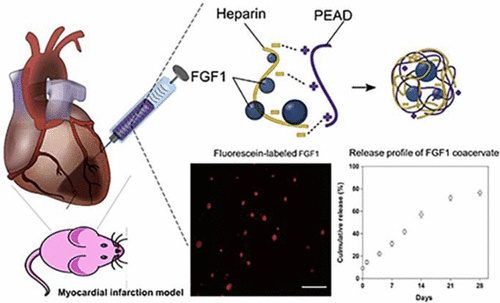当前位置:
X-MOL 学术
›
ACS Biomater. Sci. Eng.
›
论文详情
Our official English website, www.x-mol.net, welcomes your
feedback! (Note: you will need to create a separate account there.)
Fibroblast Growth Factor-1 Released from a Heparin Coacervate Improves Cardiac Function in a Mouse Myocardial Infarction Model
ACS Biomaterials Science & Engineering ( IF 5.4 ) Pub Date : 2017-04-05 00:00:00 , DOI: 10.1021/acsbiomaterials.6b00509 Zhouguang Wang 1, 2 , Daniel W. Long 1 , Yan Huang 1, 2 , Sinan Khor 3 , Xiaokun Li 2 , Xiao Jian 2 , Yadong Wang 1
ACS Biomaterials Science & Engineering ( IF 5.4 ) Pub Date : 2017-04-05 00:00:00 , DOI: 10.1021/acsbiomaterials.6b00509 Zhouguang Wang 1, 2 , Daniel W. Long 1 , Yan Huang 1, 2 , Sinan Khor 3 , Xiaokun Li 2 , Xiao Jian 2 , Yadong Wang 1
Affiliation

|
Emerging evidence supports the beneficial effect of fibroblast growth factor-1 (FGF1) on heart diseases, but its application has been hindered by the short half-life and limited bioactivity of the free protein. We designed an injectable coacervate to facilitate robust growth factor delivery, which would both protect and increase the bioactivity of growth factors. In this study, a model for acute myocardial infarction was established in mice, and the cardioprotective effect of the FGF1 coacervate was investigated. Echocardiographic results showed that the FGF1 coacervate inhibited ventricular dilation and preserved cardiac contractibility more than the free FGF1 and the saline control within the 6-week duration of the experiments. Histological examination revealed that the FGF1 coacervate reduced inflammation and fibrosis post-MI, significantly increased the proliferation of endothelial and mural cells, and resulted in stable arterioles and capillaries. Furthermore, the FGF1 coacervate improved the proliferation of cardiac stem cells 6 weeks post-MI. However, free FGF1, dosed identically, did not show significant difference from saline treatment. Thus, one injection of FGF1 coacervate was sufficient to attenuate the injury caused by MI, and the results were significantly better than those obtained from an equal dose of free FGF1.
中文翻译:

从肝素凝聚层释放的成纤维细胞生长因子-1改善小鼠心肌梗死模型中的心脏功能。
新兴证据支持成纤维细胞生长因子1(FGF1)对心脏病的有益作用,但由于其半衰期短和游离蛋白的生物活性有限,阻碍了其应用。我们设计了一种可注射的凝聚层,以促进强劲的生长因子传递,这将既保护又增加了生长因子的生物活性。在这项研究中,在小鼠中建立了急性心肌梗塞模型,并研究了FGF1凝聚层的心脏保护作用。超声心动图结果显示,在实验的6周内,FGF1凝聚层比游离FGF1和盐水对照组更能抑制心室扩张并保持心脏收缩性。组织学检查显示,FGF1凝聚层可减少心肌梗死后的炎症和纤维化,显着增加了内皮和壁细胞的增殖,并导致了稳定的小动脉和毛细血管。此外,FGF1凝聚层可改善心肌梗死后6周心肌干细胞的增殖。但是,相同剂量的游离FGF1与盐水处理没有显着差异。因此,一次注射FGF1凝聚层足以减轻MI引起的损伤,其结果明显优于从等剂量的游离FGF1获得的结果。
更新日期:2017-04-05
中文翻译:

从肝素凝聚层释放的成纤维细胞生长因子-1改善小鼠心肌梗死模型中的心脏功能。
新兴证据支持成纤维细胞生长因子1(FGF1)对心脏病的有益作用,但由于其半衰期短和游离蛋白的生物活性有限,阻碍了其应用。我们设计了一种可注射的凝聚层,以促进强劲的生长因子传递,这将既保护又增加了生长因子的生物活性。在这项研究中,在小鼠中建立了急性心肌梗塞模型,并研究了FGF1凝聚层的心脏保护作用。超声心动图结果显示,在实验的6周内,FGF1凝聚层比游离FGF1和盐水对照组更能抑制心室扩张并保持心脏收缩性。组织学检查显示,FGF1凝聚层可减少心肌梗死后的炎症和纤维化,显着增加了内皮和壁细胞的增殖,并导致了稳定的小动脉和毛细血管。此外,FGF1凝聚层可改善心肌梗死后6周心肌干细胞的增殖。但是,相同剂量的游离FGF1与盐水处理没有显着差异。因此,一次注射FGF1凝聚层足以减轻MI引起的损伤,其结果明显优于从等剂量的游离FGF1获得的结果。






























 京公网安备 11010802027423号
京公网安备 11010802027423号